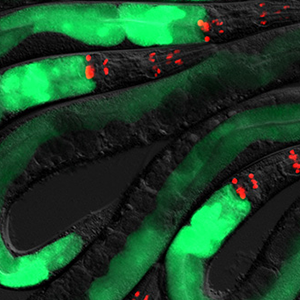Research
 Faculty members in the Program in Innate Immunity (PII) are renowned leaders for their substantial contributions to the field. Our program also continues to attract early-stage investigators who represent the next generation of rising stars in this exciting research area.
Faculty members in the Program in Innate Immunity (PII) are renowned leaders for their substantial contributions to the field. Our program also continues to attract early-stage investigators who represent the next generation of rising stars in this exciting research area.
The innate immune response is a powerful mechanism to eliminate infections caused by bacteria, viruses, parasites, and fungi. However, because the ensuing response can damage the host when left unchecked, tight regulation is critical to prevent the pathogenesis of several diseases.
Diseases of innate immunity
Immune responses to bacteria: Drug-resistant bacterial strains are developing at an alarming rate. PII faculty are determining how pathogenic bacteria, such as Yersinia, Salmonella, Listeria, and Neisseria gonorrhoeae, trigger the innate immune response and are translating these findings to develop novel vaccines and therapies.
Immune responses to viruses: A major focus of research in the PII program is understanding the molecular basis of anti-viral immunity. Our PII faculty are studying all aspects of viral infection, from virus receptors to innate immune responses, and using the results to develop innovative treatments and prevention strategies. Our researchers have ongoing studies on SARS-CoV-2, Influenza, Herpes simplex virus, Epstein-Barr virus, and HIV, among several others.
Immune responses to fungi: Fungal infections account for nearly one million deaths, annually. Researchers in the PII are focused on understanding how the innate immune system recognizes and responds to pathogenic fungi and applying this knowledge to develop immunotherapies and preventive vaccines.
Immune responses to protozoan parasites: Parasitic infections caused by Plasmodium species, Toxoplasma, Leishmania, and Trypanosomes cause significant morbidity and mortality worldwide. Researchers in the PII program are examining how these parasites interact with and evade the immune system, to develop new therapies to treat these infections.
Autoinflammatory diseases: Several PII labs are studying monogenic diseases associated with innate immune pathways including diseases associated with nucleic acid signaling [e.g., STING-associated vasculopathy with onset in infancy (SAVI)] as well as diseases associated with gain of function mutations in inflammasome genes (e.g., Cryopyrinopathies).
Neurodegenerative disease: The neurodegeneration observed in patients with Alzheimer's disease is a result of inflammation in the brain causing neuronal cell death—especially in regions associated with memory. Investigators in PII are testing the hypothesis that the NLRP3 inflammasome (a multiprotein complex that generates cytokines) plays a central role in this process. The overarching goal of these studies is to identify preventive and treatment measures to stop the progression of this devastating disease. Additional investigation is focused on the role of DNA sensing, especially the cGAS-STING pathway in the pathogenesis of Amyotrophic Lateral Sclerosis.
Autoimmune diseases: Several PII labs are involved in cutting-edge research on autoimmune diseases. These studies include elucidating how innate immune sensors activate autoreactive B cells and T cells in models of systemic autoimmunity and fibrosis. PII faculty members are also focused on understanding how innate immune sensors regulate autoimmune diseases such as systemic lupus erythematosus, inflammatory bowel disease, and vitiligo.
Barrier defense: Barrier surfaces like the skin, the mucous membrane, and even the eye are critical locations where potentially infectious microbes may contact our cells. Several PII investigators are focused on understanding how the innate immune response is tuned to specifically deal with the challenges unique to these barrier surfaces.
Host-Microbiome interactions: The gut is colonized by trillions of microorganisms, termed the microbiota. Some PII investigators focused on understanding how the gut immune system interacts with the microbiota to promote intestinal health and how it becomes dysregulated to drive inflammatory diseases.
